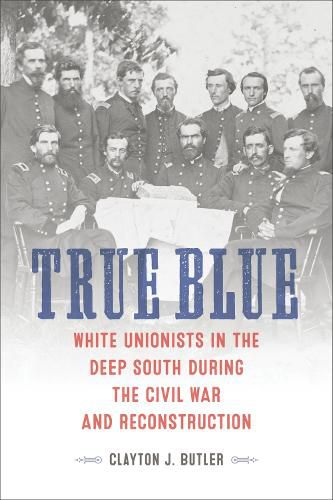Readings Newsletter
Become a Readings Member to make your shopping experience even easier.
Sign in or sign up for free!
You’re not far away from qualifying for FREE standard shipping within Australia
You’ve qualified for FREE standard shipping within Australia
The cart is loading…






During the American Civil War, thousands of citizens in the Deep South remained loyal to the United States. Though often overlooked, they possessed broad symbolic importance and occupied an outsized place in the strategic thinking and public discourse of both the Union and the Confederacy. In True Blue, Clayton J. Butler investigates the lives of white Unionists in three Confederate states, revealing who they were, why and how they took their Unionist stand, and what happened to them as a result. He focuses on three Union regiments recruited from among the white residents of the Deep South-individuals who passed the highest bar of Unionism by enlisting in the United States Army to fight with the First Louisiana Cavalry, First Alabama Cavalry, and Thirteenth Tennessee Union Cavalry.
Northerners and southerners alike thought a considerable amount about Deep South Unionism throughout the war, often projecting their hopes and apprehensions onto these embattled dissenters. For both, the significance of these Unionists hinged on the role they would play in the postwar future. To northerners, they represented the tangible nucleus of national loyalty within the rebelling states on which to build Reconstruction policies. To Confederates, they represented traitors to the political ideals of their would-be nation and, as the war went on, to the white race, making them at times a target for vicious reprisal. Unionists’ wartime allegiance proved a touchstone during the political chaos and realignment of Reconstruction, a period when many of these veterans played a key role both as elected officials and as a pivotal voting bloc. In the end, white Unionists proved willing to ally with African Americans during the war to save the Union but unwilling to protect or advance Black civil rights afterward, revealing the character of Unionism during the era as a whole.
$9.00 standard shipping within Australia
FREE standard shipping within Australia for orders over $100.00
Express & International shipping calculated at checkout
During the American Civil War, thousands of citizens in the Deep South remained loyal to the United States. Though often overlooked, they possessed broad symbolic importance and occupied an outsized place in the strategic thinking and public discourse of both the Union and the Confederacy. In True Blue, Clayton J. Butler investigates the lives of white Unionists in three Confederate states, revealing who they were, why and how they took their Unionist stand, and what happened to them as a result. He focuses on three Union regiments recruited from among the white residents of the Deep South-individuals who passed the highest bar of Unionism by enlisting in the United States Army to fight with the First Louisiana Cavalry, First Alabama Cavalry, and Thirteenth Tennessee Union Cavalry.
Northerners and southerners alike thought a considerable amount about Deep South Unionism throughout the war, often projecting their hopes and apprehensions onto these embattled dissenters. For both, the significance of these Unionists hinged on the role they would play in the postwar future. To northerners, they represented the tangible nucleus of national loyalty within the rebelling states on which to build Reconstruction policies. To Confederates, they represented traitors to the political ideals of their would-be nation and, as the war went on, to the white race, making them at times a target for vicious reprisal. Unionists’ wartime allegiance proved a touchstone during the political chaos and realignment of Reconstruction, a period when many of these veterans played a key role both as elected officials and as a pivotal voting bloc. In the end, white Unionists proved willing to ally with African Americans during the war to save the Union but unwilling to protect or advance Black civil rights afterward, revealing the character of Unionism during the era as a whole.